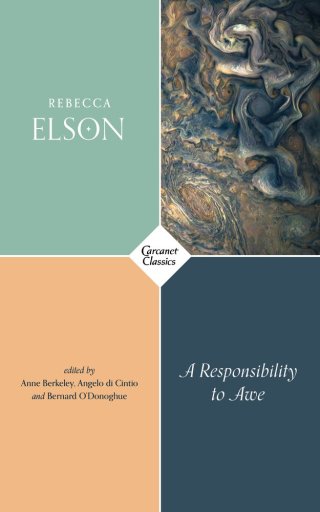The wonder of wading into the black lake boiling with light.
What is it about the human animal that impels us to interrupt the elemental elegance and perpetual incompleteness of a perfect ellipse with an arbitrary point we call a beginning? And yet here we are, once every three hundred and sixty-some days, marking the start of a new year as gravity — a force outside time and outside space, acting instantaneously on each body across limitless distances, holding the universe together — goes on dragging our planet around an orbit with no beginning and no end. Here we are, childlike in our yearning for a fresh start, our future a thing with feathers perching on that arbitrary point in the ellipse.
Rebecca Elson (January 2, 1960–May 19, 1999) was sixteen and already in university when she glimpsed Andromeda for the first time and was instantly besotted by our sister galaxy’s “delicate wisp of milky spiral light floating in what seemed a bottomless well of empty space.” The daughter of a geologist, she had grown up exploring the shores of a prehistoric lake and becoming a penetrating, sensitive observer of nature, enchanted with the night sky of northern Canada and its bellowing intimation of an infinite universe, dark and mysterious and salted with wonders. By twenty-six, having completed her doctorate in astronomy at Newton’s hallowed ground in Cambridge, Elson received a fellowship to work with the first data from the Hubble Space Telescope at Princeton’s Institute for Advanced Study, Einstein’s hallowed ground.

At twenty-nine, just as she began teaching creative writing at Harvard, stepping publicly into the private literary passion that had always buoyed her science, Elson’s blazing path of promise and possibility was dimmed by a terminal diagnosis — a rare form of lymphoma that typically afflicts the elderly. Full of life and full of wonder, she moved through the years of chemical brutality, remission, and more brutality by weaving her own parallel lifelines: She continued studying how stars are born, live, and die, and she wrote poetry — spare, stunning poems tessellating the grandest search for cosmic truth with the most humbling human search for meaning.
When she returned her borrowed stardust to the universe at only thirty-nine, she left in her meteoric path 56 scientific papers and a slender, sublime book of poetry titled A Responsibility to Awe (public library) — a reliquary of such uncommon treasures as her “Antidotes to Fear of Death,” “Explaining Relativity,” and “Theories of Everything.”
Among these delicate wisps of sensemaking is a meditation on the meaning of New Year’s Eve — on how we hold on to our tenderest humanity against the elemental austerity of this arbitrary point in our planet’s orbit. Composed at a time when Elson knew her store of new years had run out, the poem reverberates with a love of life larger than her own existence.
FUTURA VECCHIA, NEW YEAR’S EVE
by Rebecca ElsonReturning, like the Earth
To the same point in space,
We go softly to the comfort of destruction,And consume in flames
A school of fish,
A pair of hens,
A mountain poplar with its moss.A shiver of sparks sweeps round
The dark shoulder of the Earth,
Frisson of recognition,
Preparation for another voyage,And our own gentle bubbles
Float curious and mute
Towards the black lake
Boiling with light,
Towards the sharp night
Whistling with sound.
For more symphonic affirmations of life and reality at the meeting point of poetry and science, lose yourself in the Universe in Verse archives.
donating = loving
Bringing you (ad-free) Brain Pickings takes me hundreds of hours each month. If you find any joy and stimulation here, please consider becoming a Supporting Member with a recurring monthly donation of your choosing, between a cup of tea and a good dinner.
newsletter
Brain Pickings has a free weekly newsletter. It comes out on Sundays and offers the week’s most unmissable reads. Here’s what to expect. Like? Sign up.






